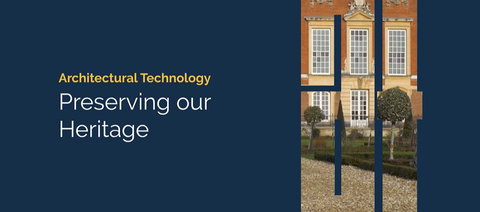Conservation Register
The CIAT Conservation Accreditation Register identifies Chartered Architectural Technologists competent in the conservation of historical buildings/assets and their surroundings.
The CIAT Accredited Conservationist Specialist Register will be accepting applications three times per year, in April, August and December.
All future applications must be made according to the revised process.
For further details, please contact [email protected]
About the scheme
CIAT’s Conservation Accreditation Scheme is recognised in the UK by the four home countries’ Heritage Bodies: Historic England, Historic Scotland, Department for Communities Northern Ireland and Cadw (Welsh Government historic environment service) for its members to act as lead consultants on grant/fund aided projects.
Suitability for the Register is based upon a technical assessment of a candidate's portfolio followed by a formal interview. This Register is relevant for those working in the UK, but applicants from other countries may also apply.
CIAT will inform candidates of the outcome of their portfolio assessment and the interview will be arranged for a mutually convenient time thereafter.
For full details on the Conservation Register Scheme see our Conservation Register Candidate Guidance notes.
A useful resource for understanding the conservation accreditation process is understandingconservation.org.
Eligibility criteria and evidence requirements
CIAT has two routes:
In order to attain Accreditation, candidates must be practising in a conservation related field and be able to demonstrate their competence against the five units through conservation projects carried out in practice. Candidates can provide five projects or choose to use several elements of projects and projects must be no more than five years old. In order to remain on the Register, candidates must retain currency in the field of conservation and this must be demonstrated to the Institute every five years. This route is recognised by grant/fund providing bodies as identified above.
CIAT recognises that some of its members, although having sufficient knowledge in the area of conservation, may not be practising in this area and will therefore be unable to demonstrate the competence required through the conventional assessment route. Instead, CIAT will accept five case studies (hypothetical examples) prior to awarding the designation of CIAT—Recognised Conservationist (non-practising). Candidates choosing this route will have to meet the same competences as the above route but will not be recognised by grant-fund providing bodies.
For full details on the eligibility criteria and evidence requirements see our Conservation Register Candidate Guidance Notes.
Scheme outline
There are five units within the scheme:
- Conservation knowledge
- Conservation analysis
- Conservation techniques
- Conservation methods
- Conservation expertise
For full details on the scheme outline see our Conservation Register Candidate Guidance Notes.
Application form and fees
There is a £150 joining fee which covers the cost of assessment. Applicants who are unsuccessful are advised to re-apply at a later date and will incur a re-application fee of £75.
All submissions for CIAT-Accreditation on the Conservationist Register must also include:
- CV covering candidate’s involvement in conservation.
- CPD records for the past five years of any activities that relate to conservation.
- Concise summary and report of relevant projects (up to five projects from the past five years).
- Appendices of evidence related to each project.
There is also an annual subscription fee of £60 payable from 1 May each year for continued inclusion within the Register.
You can find here the Membership and subscription fees for Conservation Accreditation.
For your guidance, here is an exemplar application form.

